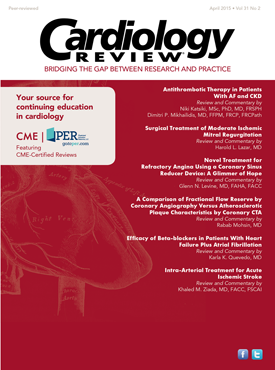Publication
Article
Cardiology Review® Online
Heart Failure Drug Approved, and Other Cardiology News
Author(s):
The recent FDA approvals of ivabradine and the WATCHMAN Left Atrial Appendage Closure Device, study results on EHRs and quality of medical care, and more are covered in this installment.
Heart Failure Drug Approved
The FDA approved ivabradine (Corlanor) to reduce hospitalizations from worsening heart failure. The medication is approved for use in stable patients with chronic heart failure and a heart rate ≥70 beats per minute on maximally tolerated beta-blockers.
The approval was based on data from the SHIFT trial, published in 2010, of 6505 participants. The study showed a highly significant 18% reduction in risk compared with placebo for cardiovascular death or hospitalization for worsening heart failure over an average of 23 months in patients treated with ivabradine.
The most common adverse events observed in clinical trial participants were bradycardia, hypertension, atrial fibrillation, and temporary vision disturbance. The medication will be dispensed with a Medication Guide. Women should not become pregnant while taking ivabradine. Ivabradine was not shown to offer clinical benefit to patients with stable coronary artery disease in the SIGNIFY trial.
Ivabradine is a product of Amgen and is already approved in Europe for angina and heart failure.
-----------------------------------
WATCHMAN Left Atrial Appendage Closure Device Approved
The FDA has approved the WATCHMAN Left Atrial Appendage Closure Device, indicated to reduce the risk of thromboembolism from the left atrial appendage in patients with nonvalvular atrial fibrillation (AF) who are at increased risk for stroke and systemic embolism based on CHADS2 or CHA2DSs-VASc scores; are deemed by their physicians to be suitable for warfarin; and have an appropriate rationale to seek a nonpharmacologic alternative to warfarin, taking into account the safety and effectiveness of the device compared with warfarin.
The WATCHMAN device, a product of Boston Scientific, will be available to US centers involved in the company’s clinical studies and additional specialized centers as physicians are trained on the implant procedure.
The FDA’s approval is based on the WATCHMAN clinical program of studies involving more than 2400 patients and nearly 6000 patient-years of follow-up. The WATCHMAN trials provided evidence that the device can be implanted safely and that it reduces the risk of stroke in eligible patients while enabling most patients to discontinue warfarin. A meta-analysis of all randomized trial data showed that although ischemic stroke reduction favored warfarin, the device provided patients with a comparable protection against all-cause stroke and statically superior reduction in hemorrhagic stroke, disabling stroke, and cardiovascular death compared with warfarin over long-term follow up.
Visit this FDA resource and this site for more specific information on the WATCHMAN Left Atrial Appendage Closure Device.
-----------------------------------
Electronic Health Records: Do They Improve Quality of Care?
A recent survey of more than 2600 physicians in 6 countries reveals that fewer physicians believe their use of electronic health records (EHRs) have improved treatment decisions, reduced medical errors, or improved outcomes even though most physicians rate themselves as more proficient in their use of EHR. The survey, conducted by Acccenture, a leading management consulting company, was released in April at the annual meeting of the Healthcare Information and Management Systems Society in Chicago.1
The survey included approximately 600 US physicians. The survey among US physicians found that health care IT use among physicians has averaged double-digit growth since a 2012 survey. However, fewer physicians now believe that EHR has improved treatment (46% vs 62% in 2012), reduced medical errors (64% vs 72%), or improved health outcomes for patients (46% vs 58%). Seventy-nine percent said they are more proficient in using EHRs than they were 2 years ago. The 5 IT capabilities that US physicians use most are entering patients’ notes electronically, prescribing drugs electronically, receiving clinical results directly into a patient’s EHR, using electronic administration tools, and sending e-orders to labs.
The downsides of EHR are numerous, however, according to surveyed physicians:
- More than two-thirds (70%) believe health care IT has decreased the amount of time they spend with patients. Despite the physicians’ perceptions that they are spending less time with patients, they don’t believe they are making poorer-quality decisions as a result.
- About 76% believe that lack of interoperability between the tools currently available limits their ability to improve the quality of patient care through health care IT.
- About half (58%) say the EHR system in their organization is hard to use.
The survey also showed that 82% of physicians believe that letting patients update their own medical records increases their engagement in their own health, improves patient satisfaction (81%), raises understanding of their health conditions (72%), and increases the accuracy of their medical records (60%).
-----------------------------------
Focusing on Cardiologists
A recent American College of Cardiology (ACC) survey found that 90% of 350 cardiologists they surveyed run EHRs in their practice, with 80% of the EHRs 2 or more years old.2 Yet only 35% of respondents were relatively satisfied with their EHR. Many of the respondents felt the positives of EHRs did not balance out what they disliked about them. Cardiologists remarked that EHRs cut into “face time” with patients; physicians spent more time behind the computer during visits, making it harder to speak directly to patients and create adequate rapport.
References
1. Accenture news release. Despite increased use of electronic medical record, fewer US doctors believe it improves health outcomes, Accenture survey shows. Chicago, IL, April 13, 2015.
2. Marshall A. EHRs: heartache & helpmate for cardiologists. Cardiovascular Business.






